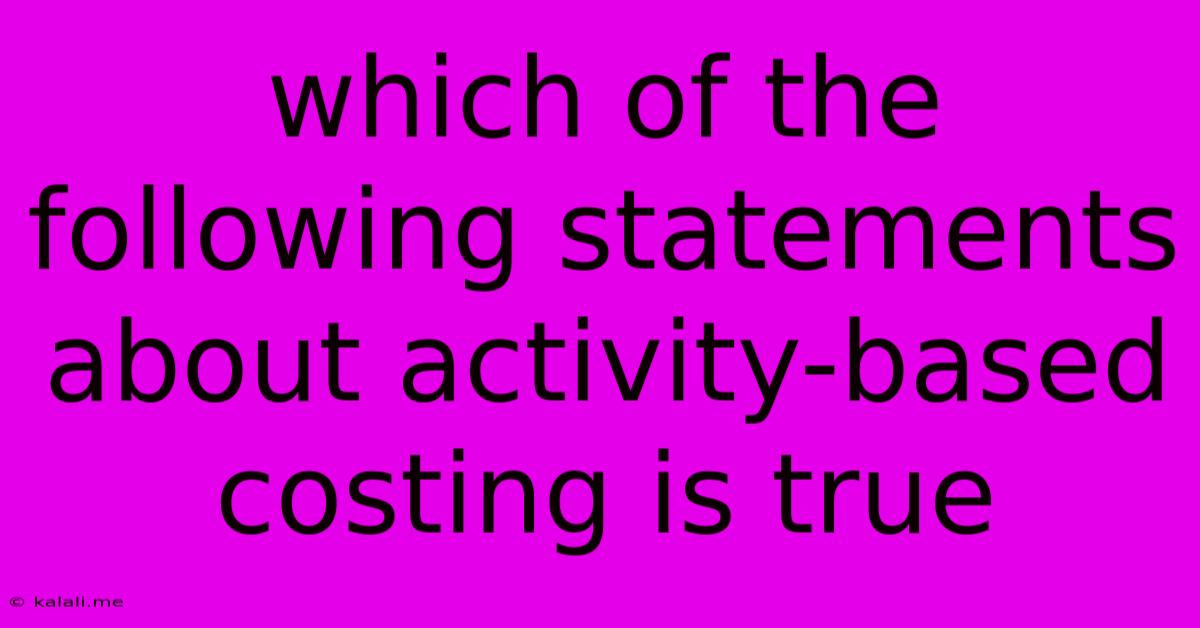Which Of The Following Statements About Activity-based Costing Is True
Kalali
Jun 14, 2025 · 3 min read

Table of Contents
Which of the Following Statements About Activity-Based Costing (ABC) is True? A Comprehensive Guide
Activity-based costing (ABC) is a sophisticated costing method that assigns overhead costs to products or services based on the activities that consume those resources. Unlike traditional costing methods that rely on broad allocation bases like direct labor hours, ABC drills down to identify specific activities and their associated costs. This leads to a more accurate and granular understanding of product profitability and cost drivers. This article will explore common statements about ABC and determine which are true. Understanding ABC is crucial for businesses seeking to optimize pricing strategies, improve operational efficiency, and make informed decisions.
Understanding the Core Principles of Activity-Based Costing
Before evaluating the truth of various statements about ABC, it's important to grasp its fundamental principles:
- Activity-Based Cost Pools: ABC uses multiple cost pools, each representing a specific activity (e.g., machine setup, quality inspection, material handling). Costs are accumulated within these pools.
- Cost Drivers: Each cost pool is linked to a specific cost driver, a factor that influences the cost of that activity (e.g., number of setups, number of inspections, number of material moves).
- Cost Allocation: Costs within each pool are allocated to products or services based on their consumption of the cost driver. A product requiring many setups would absorb a larger share of setup costs than a product requiring few.
Now, let's analyze some common statements about ABC and determine their veracity:
Statement 1: ABC is always more accurate than traditional costing methods.
Partially True. While ABC generally offers greater accuracy by considering a wider range of activities and their drivers, it's not universally more accurate. Its accuracy depends on the diligence in identifying activities, selecting appropriate cost drivers, and collecting accurate cost data. Traditional costing, while simpler, can be sufficient for businesses with a homogenous product line and relatively low overhead costs. The accuracy improvement is relative to the complexity of the business.
Statement 2: ABC is more expensive to implement than traditional costing.
True. ABC requires more time, effort, and resources to implement than traditional costing. Identifying activities, assigning costs to activities, and determining appropriate cost drivers require significant upfront investment in data collection, analysis, and system changes. This additional cost needs to be weighed against the potential benefits of improved accuracy and decision-making.
Statement 3: ABC is only useful for manufacturing companies.
False. While ABC is frequently used in manufacturing, its applicability extends to service industries and other sectors. Any business with significant overhead costs and a desire for more granular cost understanding can benefit from ABC. Examples include hospitals, consulting firms, and even non-profit organizations. The principles of identifying activities and cost drivers remain universally applicable.
Statement 4: ABC provides a more detailed understanding of product costs.
True. This is a core advantage of ABC. By breaking down overhead costs into specific activities and tracing them to individual products, businesses gain a much clearer picture of the true cost of each product. This detailed understanding facilitates more effective pricing strategies and allows for better identification of areas for cost reduction.
Statement 5: ABC eliminates the need for traditional costing methods.
False. ABC doesn't necessarily replace traditional costing methods entirely. In many cases, a hybrid approach, incorporating elements of both ABC and traditional costing, provides the most practical and efficient solution. Simple products might still be costed traditionally, while more complex ones may benefit from the detailed analysis provided by ABC.
Conclusion:
Activity-based costing offers a powerful approach to cost accounting, particularly for businesses with complex operations and a need for detailed cost analysis. While it comes with implementation costs, the enhanced accuracy and insights it provides can significantly improve decision-making, pricing strategies, and operational efficiency. Understanding the limitations and benefits is crucial for determining if ABC is the right fit for your specific business needs.
Latest Posts
Latest Posts
-
For The Function F For Each Increase
Jun 14, 2025
-
Which Of The Following Species Has The Largest Radius
Jun 14, 2025
-
Chemicals That Resist Changes In Ph Are Called
Jun 14, 2025
-
What Is The Least Common Multiple Of 3 4 5
Jun 14, 2025
-
What Is Not A Primary Colour
Jun 14, 2025
Related Post
Thank you for visiting our website which covers about Which Of The Following Statements About Activity-based Costing Is True . We hope the information provided has been useful to you. Feel free to contact us if you have any questions or need further assistance. See you next time and don't miss to bookmark.